The following case studies are all featured in this years Good Food Local: The London report.
Food governance & strategy
Lewisham: diversity in the food partnership
The Steering Group of the Good Food Lewisham food partnership consists of a diverse group of individuals including nutritionists and academics to foragers and food growers, food aid groups and residents. There are also representatives from Lewisham Council’s Public Health, Climate and Business departments, as well as Lewisham Local which hosts the partnership. Equity, diversity and inclusion (EDI) is a standing item on the steering group meeting agenda, with a group member participating in Food Matter’s anti-racist working group to support this work on a national level. Lewisham Local undertook SFP’s REDI exercise as part of their EDI working group and have subsequently introduced a ‘safer spaces’ policy to further support this work.
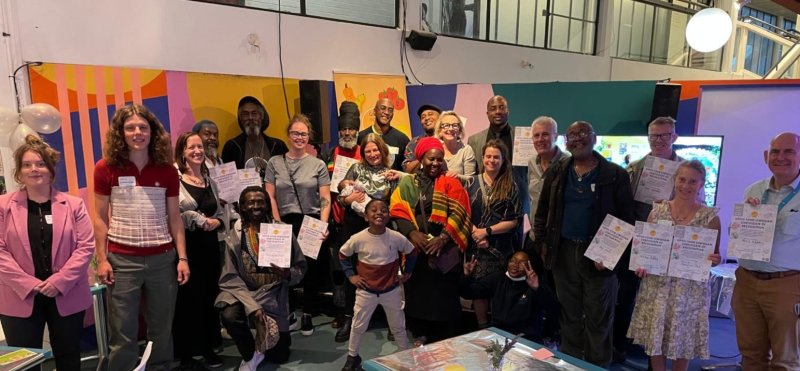
To broaden community engagement, network meetings are organised together with local community groups and businesses, to reach people who are unlikely to find out about events due to digital exclusion. Meetings are also held in different wards of the borough on different topics to widen reach and meet different people’s needs. Good Food Lewisham received a Silver Award through the SFP programme in July 2024.
The partnership collects demographic data on event attendance to review how reflective the meetings were of the local community and to inform future topics and changes as needed. Anonymised data is shared with commissioners at Lewisham Council. Embedding EDI within the food partnership is an ongoing journey and there are actions within Good Food Lewisham's new Action Plan that outline additional steps GFL is working towards.
Sustainable Food London: 16 Sustainable Food Partnerships
London is a hive of food activity, with 16 boroughs now members of the Sustainable Food Places network: Barking and Dagenham, Barnet, Brent, Camden, Ealing, Greenwich, Hammersmith and Fulham, Islington, Lambeth, Lewisham, Merton, Newham, Southwark, Tower Hamlets, Waltham Forest and Wandsworth, and Greater London itself is also a Sustainable Food Place. Several others are developing food partnerships, including those involved in the GLA funded Food Roots 2 programme, supporting boroughs to develop joined up food alliance work. To learn more and join the fast-growing network, please visit: www.sustainablefoodplaces.org
Community food growing
Southwark: the first London borough to adopt the Right to Grow motion
Southwark Council’s decision to pass this motion is a recognition of the significant role community growing plays in creating essential habitats for nature and generating immense social value and access to fresh fruit and veg. This landmark decision by Southwark Council is the culmination of four years of groundwork laid by Southwark Council’s community gardening team, which set up a process in 2021 for residents on estates to set up and run growing projects with council support, which has led to 21 new gardens with 241 food growing plots with more in development. The Community Gardening officer role was established in 2020 and is the main point of contact in the council for growing enquiries, working closely with other council teams on project delivery and sharing newsletters, funding and training opportunities to residents. To support new and existing gardening groups and organisations through a Southwark network the two part-time officers organise a busy calendar of events and training, from community organising to composting; connecting individuals with projects and organisations and promoting peer-to-peer support. They’re a thriving example of how even built-up inner-city boroughs can carve out pockets of land for food growing.
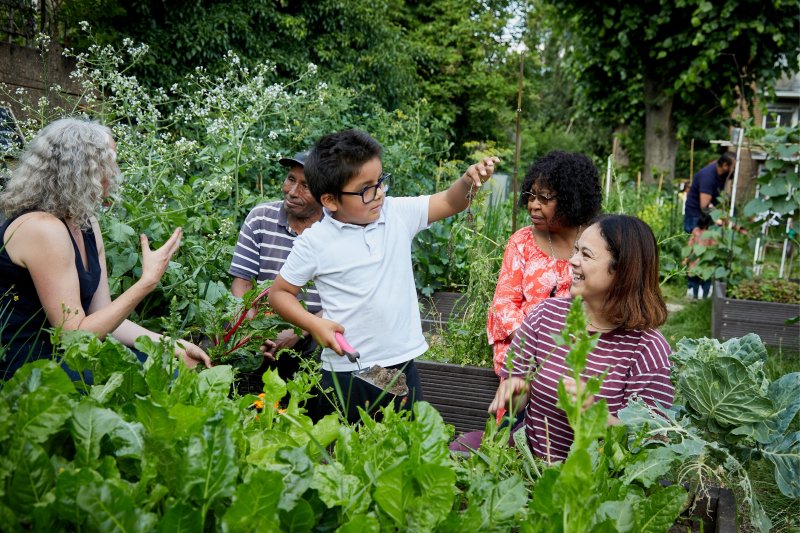
Barnet: Training Community Food Growing Leaders
To increase the number of community food growing projects in the borough, Barnet Council identified the need for more community food growing leaders. With funding from the Barnet Public Health Prevention Fund a one-year pilot project was co-designed and implemented by the Greenspaces and Public Health teams and Incredible Edible Barnet. With £45,000 of funding, the project aimed to increase access to food growing for residents by creating four new community food growing sites and training a cohort of community food growing leaders.
Fifty-four people completed the 16-week programme, learning how to establish and run a peri-urban food growing project. The four new community food growing sites are thriving and appreciated.
The project brought together a diverse range of participants in terms of age, nationality, ethnicity, and socioeconomic status and improved health, wellbeing and community connection. It also created connections between schools and community organisations, revived underutilised community spaces, and provided a successful model for partnership working with grassroots organisations. The project has garnered attention across London, with members of the Barnet Community Food Growing Leaders programme presenting the project at a Capital Growth event in October 2024, resulting in follow-up meetings with several boroughs about the project and how this can be replicated.
The project has now secured funding for 2025 to expand the growing spaces at each of the four sites, continue the leader training, and offer drop-in community gardening sessions for all.
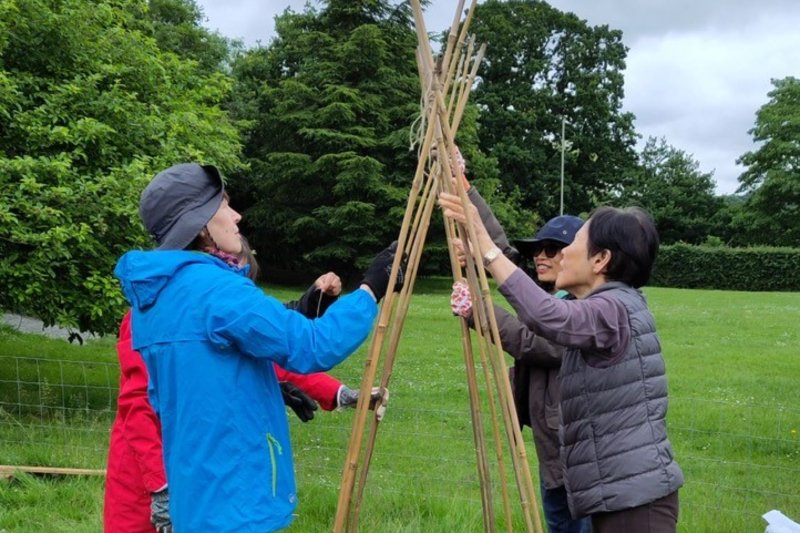
RBKC: supporting community food action
The Royal Borough of Kensington and Chelsea (RBKC) supports community food projects, with a focus on those led by marginalized groups, through a variety of methods. These include grants for community food projects, and the Community Resilience Support Project (CRSP) which provides training to Food Network members to help them offer comprehensive support to residents.
RBKC works to raise public awareness around food, health, and sustainability issues and promote foodie opportunities and events such as workshops, competitions, food festivals and markets where residents can learn about and enjoy healthy, sustainable food via social media, community newsletters and local media. These events are designed to be accessible and enjoyable for everyone, which includes targeted outreach efforts and inclusive messaging to engage diverse communities. RBKC also provide training and volunteering opportunities to help residents develop skills in food growing, cooking, processing, and enterprise. RBKC engages in initiatives to amplify diverse community voices and support leaders, including through their Food Support Network.
Food access for older and disabled people
Hammersmith and Fulham: Nourishing older and disabled residents
Hammersmith and Fulham Council (H&F) part fund Nourish Hub, a community food hub operated by the charity UKHarvest, using largely surplus produce to deliver services including a low-cost community lunch and cooking classes for adults and children, as well as linking with wraparound support services. In addition to the services based at the centre, the Council also commissions Nourish Hub to provide a Meals and a Chat service, producing healthy and sustainable meals which are delivered by cargo bike at just £2 per meal. As a key component of the service, our trained staff go beyond delivering meals by conducting regular wellbeing checks and offering meaningful, friendly conversations. This personal touch helps to support vulnerable residents at risk of social isolation, transforming the service into a comprehensive care experience that goes far beyond the traditional Meals on Wheels model. One resident mentioned that the chat they receive as part of the service is often the only time they speak to someone that day, highlighting the importance of the scheme. H&F social workers are trained in awareness raising of Meals and a Chat service and continuous feedback from residents is used to alter and improve the service.
The Co-Production Matters H&F Group was set up in 2019 and includes Disabled residents, senior council staff and councillors. They work together to encourage and enable co-production across the whole community to review all relevant new strategies and initiatives to ensure the views of disabled residents are heard, including in the borough’s upcoming Food Plan. The group uses the Disabled People’s Commission report and its recommendations as the starting point for its work alongside the council’s strategic priority of ‘doing things with residents not to them'.
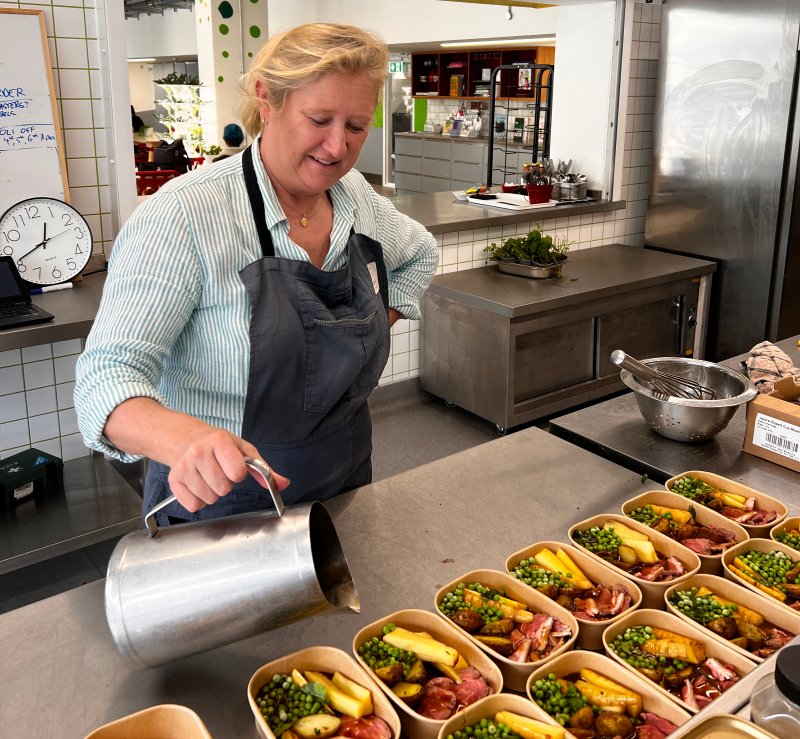
Food access for people with no recourse to public funds
Lambeth: removing barriers for people with no recourse to public funds
Lambeth Council is working to create a food system where everyone in the borough can eat well and make culturally appropriate and nutritious food choices that nourish themselves, their community and the environment. It is based on the principles of food justice and equality for all. The council has taken a strategic approach to support people with No Recourse to Public Funds (NRPF) through an integrated referral hub team which provides a single point of access, making it easier for residents with NRPF to access support. Outreach links are made to ensure relevant organisations are aware of the help available, and residents receive streamlined referrals. In addition, the council is supporting food distribution across the borough via 75+ VCS organisations providing food assistance to people with NRPF that take account of cultural and religious needs.
The Lambeth Holiday Activities and Food Programme provides free places for children and young people with NRPF during school holidays, providing support to children with NRPF from nine different counties last year. Providers are required to ensure meals are culturally appropriate, and last year the council also funded fruit, water bottles and Create & Make meals boxes.
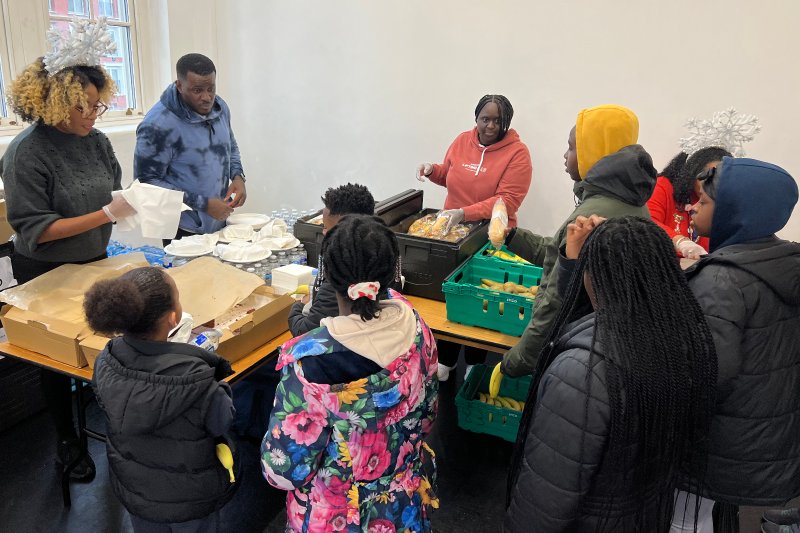
Infant feeding
RBKC and Westminster City Council: Joint breastfeeding work
Support with infant feeding is offered jointly across Westminster and Kensington and Chelsea, with the Public Health commissioned Health Visiting Service being awarded UNICEF UK’s Baby Friendly Gold award. Infant feeding support is led by the specialist Infant Feeding Lead and delivered at new birth visits and follow-up contacts at home and in child health clinics. Specialist breastfeeding support is offered at some of the Family Hubs and a monthly timetable of infant feeding support groups is distributed digitally and with physical copies, with staff also signposting to national support services.
The Public Health teams commission Maternity Champions to deliver breastfeeding support on the maternity ward of St Mary’s and Chelsea and Westminster hospitals, as well as a Start4 Life club for expectant parents and a Mini club for parents with 0-4 year olds, supporting expectant and new parents with the skills, knowledge and resources to support them in eating and sleeping well, keeping active and emotional wellbeing. An integrated breastfeeding plan for Westminster and Kensington and Chelsea is currently in development.
Healthy Start
Haringey: giving children a Healthy Start
Funded by the Mayor of London, Haringey council’s Digital & Change, Policy and Public Health teams worked in partnership with Policy in Practice and the GLA’s Equality and Fairness team using the Low Income Family Tracker (LIFT) to increase uptake of the Healthy Start scheme in the borough. Using data gathered from LIFT, letters and texts were sent to households that were identified as entitled but not registered for the Healthy Start in April 2024. The resulting increase in uptake means residents accessed an additional £9,350 in 2024, with a predicted additional £32,000 over the campaign's lifetime.
Using funding from the GLA as part of the Food Roots 2 grant, the Public Health team is working in partnership with Bridge Renewal Trust to promote the scheme and train volunteers through Haringey’s Food Network. They delivered a local campaign from September-October 2024 to help the locality to apply for Healthy Start. This included promotional materials in Food Network locations alongside digital promotion of the scheme.
Stemming the flood of unhealthy food
Hounslow: Restricting unhealthy food advertising for all ages
Hounslow Council has signed off the first ever comprehensive healthier baby food advertising policy. The policy was brought in as part of their Healthier Food Advertising Policy and will address misleading and inappropriate unhealthy products marketed to young children.
They are the first Local Authority of any size to act on the World Health Organization’s (WHO) calls to comprehensively restrict the inappropriate marketing of commercial baby food. Evidence from the UK and beyond shows many products have poor nutrition and are misleadingly marketed, masking unhealthy qualities.
Their Healthier Food Advertising Policy is a key component of the Council’s Whole Systems Approach to a Healthy Weight. It involves a range of initiatives that are being implemented across the borough to help make the healthier choice the easier one; recognising that there is no one single solution to address food related ill health such as obesity, type 2 diabetes, tooth decay and heart disease.
Greenwich: A cross-department approach for healthier convenience stores
Convenience store work is part of Royal Borough of Greenwich’s overall commitment to good food retail. This year the council has been piloting work with Rice Marketing in the superzone, to explore the role of different departments in supporting convenience stores to improve their offer. Partners across environmental health, public health, economic development, GCDA and Peabody Trust are working together to explore the levers across the council and wider food partnership to support this agenda.
In addition, the council has supported the development of Good Food in Greenwich charters, with a particular focus on the retail charter this year. Currently 56 settings have achieved the charter which recognises a settings commitment to sustainability and good food. The council is also currently involved in a University of Southampton academic study to consider the impact of new HFSS legislation on SMEs including convenience stores.
Islington: Families for Life programme – teaching kids to eat fruit and vegetables
Families for Life works with families to help them feel good and live well. The council delivers two programmes as part of Families for Life. In total we deliver 30 programmes reaching 180 families a year. The programmes are evaluated using UCL’s Child Eating Behaviour Questionnaire and the results are analysed by Islington Public Health team which shows that we make a significant difference to children being more willing to try new foods especially fruit and vegetables.
The two programmes are Family Kitchen and Taste Education.
Family Kitchen
Family Kitchen works with parents to teach them to cook food and share meals. The sessions include education on nutrition and planet-friendly food and include dishes from different cultures. Impacts include an increase in children’s willingness to try new fruit and vegetables, helping children’s development of fine motor skills, families choosing healthier foods, and families enjoying quality time together.
Taste Education
Islington Council delivers training and support for schools and early years settings to offer Taste Education in the curriculum based on TastEd resources. Children work in groups, talking and writing about what they see, smell, touch, hear and taste. Allowing children to explore new fruit or vegetables can give them confidence to try something they otherwise wouldn’t, which translates to children potentially eating more fruit and vegetables in their school lunches and beyond. Each early years setting and school that delivers Taste Education in their curriculum is offered a parent workshop so that parents can implement the same approach at home.
Islington also runs Taste Education programmes for families and children, this has been shown to be particularly effective for children with autistic traits. Those that were previously being seen by a dietitian for their limited diet were able to be discharged after attending a Taste Education programme as they all had made significant progress in trying new foods.
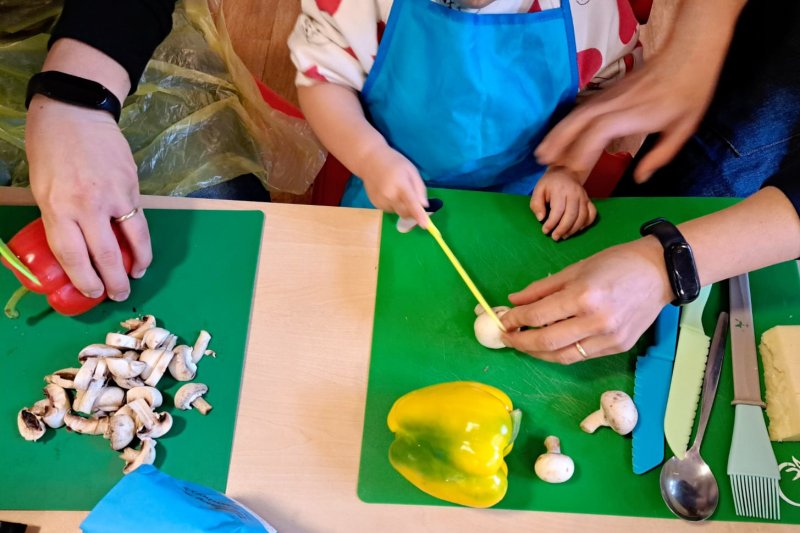
Sustainable food economy
Brent: Vibrant, inclusive markets
Brent Council strives to create a vibrant, inclusive market environment that offers fresh, culturally diverse food options, and supports the growth of local food SMEs.
To enhance the availability of culturally diverse food, the council prioritises market spaces like Ealing Road, where culturally specific products are readily available. Efforts are underway to support a wider range of vendors, including those from diverse backgrounds, by providing access to resources, business mentoring and potential grant opportunities.
The council recognises that current licensing rates for market traders present a challenge, particularly for new startups and culturally diverse businesses. While Brent’s licensing department does not yet offer reduced rates or specific incentives, town centre managers have actively lobbied to align market fees with neighbouring boroughs.
Support provided to food SMEs, particularly those run by or serving diverse ethnic and cultural groups, is part of the council’s Economic Growth / Town Centre Management approach. Their aim is for businesses to thrive while contributing to a sustainable and inclusive food economy, with new businesses offered advice and guidance when starting up to ensure they are well equipped for compliance and growth.
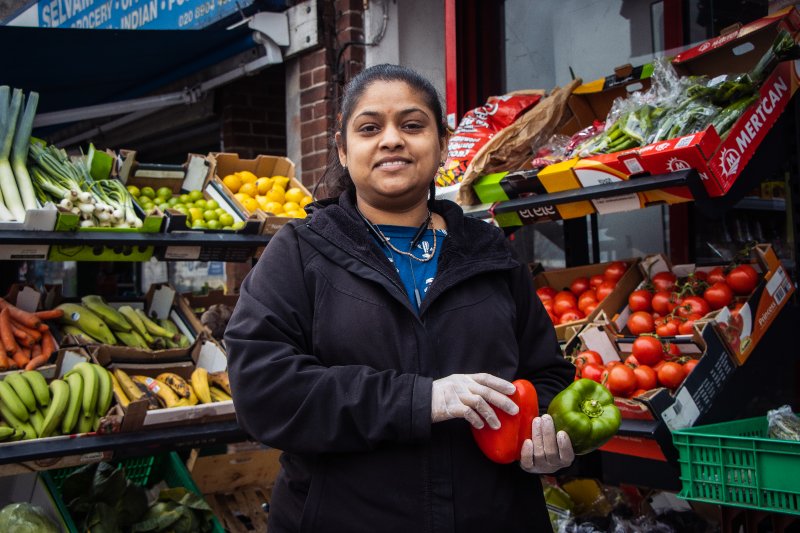
Westminster: Thriving SMEs
Westminster City Council supports food SMEs to thrive in a number of ways. Their ‘Start-up to Scale-up Programme’ provides 6 months of support to ambitious start-ups, including a specific cohort for hospitality and retail businesses, to accelerate business growth. The council also participates in a collaborative cross council partnership, Inclusive Growth London, that provides meaningful, scale-up support to eligible micro and small businesses from a range of sectors and targeting female and/or disabled owned businesses.
At markets in the borough, new start-up businesses are offered a discounted licence fee. The council is also running a number of women in employment market related events this year, along with events for black women in employment. In addition, SMEs and landlords with SME tenants in Westminster are offered an energy and carbon audit, with funding available for the quick, energy saving recommendations.
Catering & procurement
Ealing: Cross cutting work on public health, climate and Equality, Diversity and Inclusion
Ealing Council has taken steps to reduce waste by developing a circular economy recycling centre in partnership with West London Waste Authority. The facility will offer community classes, volunteering opportunities and apprenticeships, promoting sustainable living whilst supporting those on limited budgets through affordable repair services and surplus food access. Ealing Council is addressing food-related health inequalities through its Multicultural & Healthy Planet Project which focuses on engaging Somali, Punjabi, Arab, Eastern European, Polish, Romanian and Asian communities across the borough, developing resources that blend traditional dietary choices with planetary health considerations. They will promote healthy, sustainable eating habits whilst respecting different cultural practices and traditions.
The Climate Action and Area Regeneration Teams developed a project called Breaking Ground with residents on a Northolt estate. The project empowered residents to develop 'green' solutions to issues that are most affecting them, whilst improving health, wellbeing, and the local environment. Working with Urban Edible Gardens as a delivery partner, the project successfully established a community food growing space on the Radcliffe/Yeading Estate, with residents expressing strong interest in food planters outside residential blocks, fruit trees, and cooking classes to encourage healthy eating. While the community garden initially faced accessibility challenges, steps were taken to improve access through new footpaths. The project, which concluded in 2024, demonstrated positive impact on community cohesion and healthy eating habits. We are currently seeking funding to replicate this successful model across other estates in Ealing.
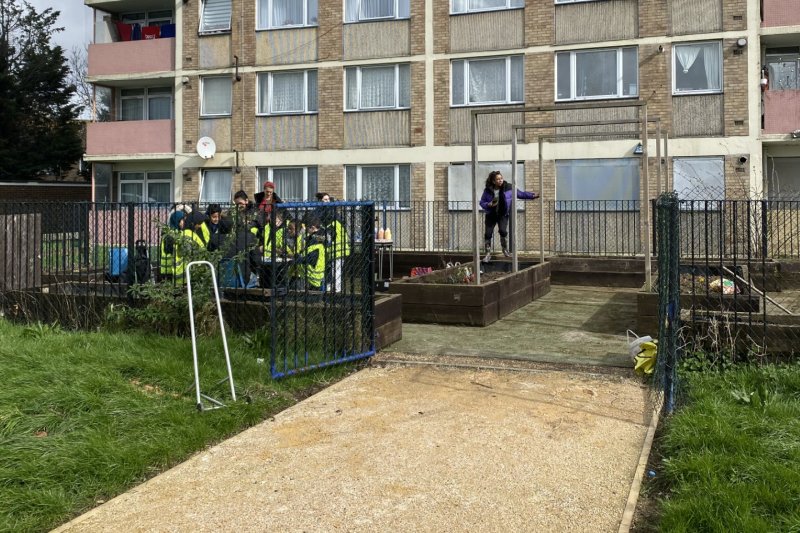
Merton: Green school catering with Food for Life
Merton Council employs a dedicated officer to visit schools and assess the quality of school meals. They hold monthly contract management meetings and frequent informal meetings with the provider. The menus are assessed alongside other contract specifications such as suppliers, Fairtrade products, sustainability, staff training, and food safety in line with the council’s procurement strategy.
The primary school catering contract includes two meat-free days a week and on-site food preparation in line with Food For Life Silver standards and government recommendations. Commitments include the use of free-range, RSPCA-assured eggs, Red Tractor meat, MSC sustainably sourced fish, and various Fairtrade products. There is a range of meat, vegetarian, and vegan options, a daily salad bar, vegetables, and two types of fresh bread baked on site. Freshly cut fruit and naturally flavored yoghurt are available daily as alternatives to homemade desserts. All desserts contain less than 6.5g of free sugars per portion. The contractor has also worked to replace meat protein with alternative protein sources.
Hackney: Sustainable Food Leadership
Hackney leads the One World Living Programme's food theme through sustainability initiatives co-designed with ReLondon. As one of the first signatories of the London Food Purchasing Commitment, the borough co-leads the development of the "Eat Like A Londoner" campaign, promoting plant-based eating and food waste prevention across the community. The Council has made significant strides in school and community engagement, supporting eight children's centres and 13 schools in achieving the ProVeg Bronze School Plates Award. By working closely with caterers, Hackney is elevating school meal approaches to prioritise healthier and more sustainable options. The Council has also recently delivered an internal campaign to encourage staff to eat more plant-based foods, to strategically keep this theme at the forefront for Council contract managers, ensuring plant-based targets are embedded into all Council catering-related contracts. To date over 500 staff have been engaged to encourage plant-based eating habits.
Hackney's strategic vision extends to comprehensive food system transformation, with ambitious targets including a commitment to reducing food emissions by 38% by 2030 and a goal of reducing food waste by 50%. These efforts position the borough as a pioneering leader in municipal sustainable food strategies, demonstrating how local governments can drive meaningful environmental change through targeted, collaborative approaches.
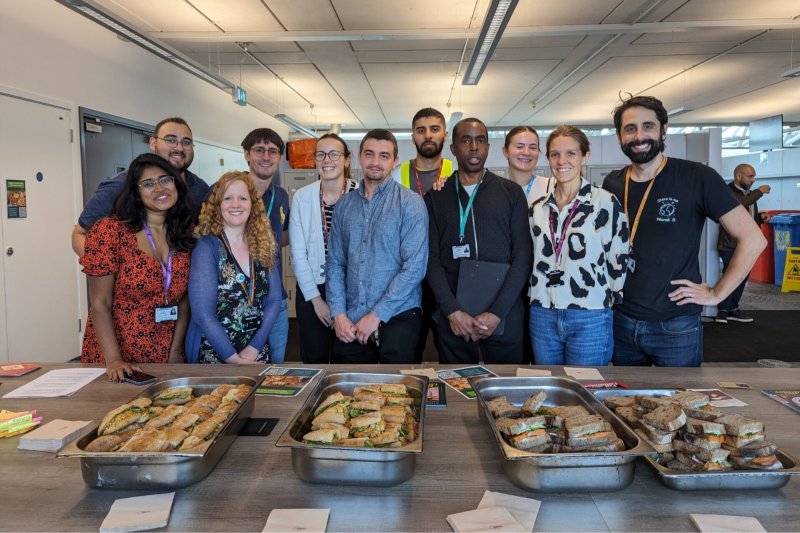
Good Food Local: The London report
Good Food Local: Supporting local authorities to create more healthy and sustainable food systems in their local areas.
